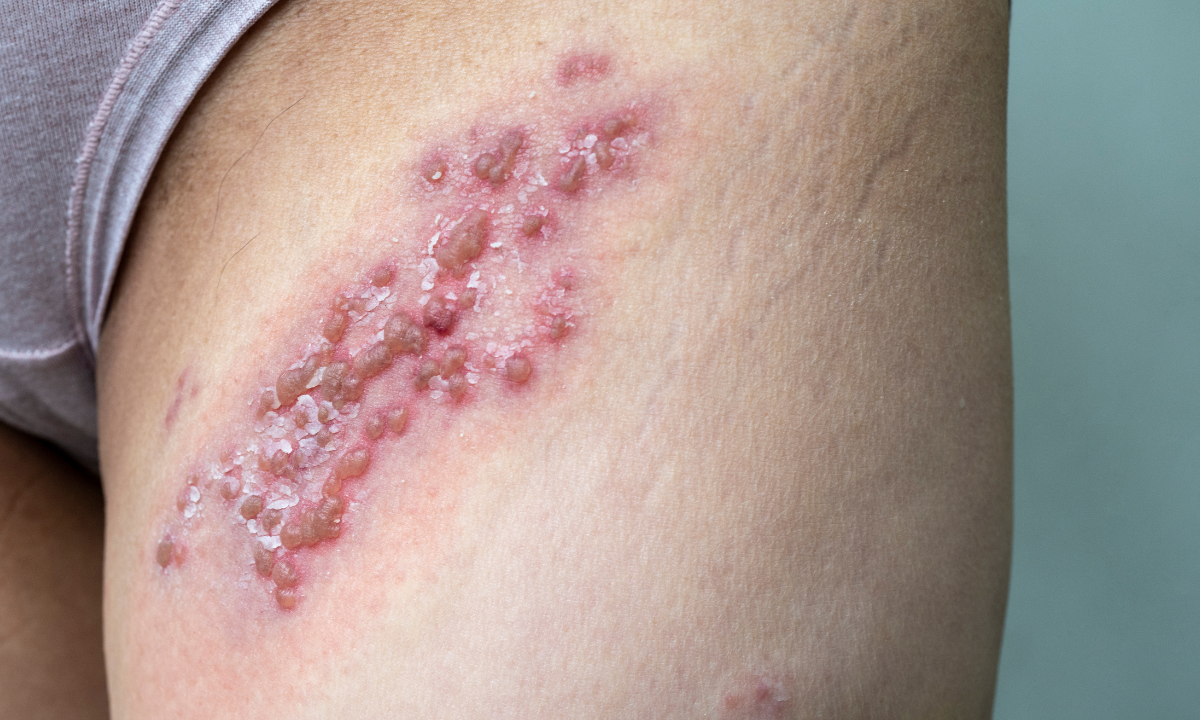Genital herpes is one of the most common yet often misunderstood sexually transmitted infections—but it doesn’t have to control your life. Caused by the herpes simplex virus (HSV), it can affect anyone who is sexually active.
By understanding what genital herpes is, how it spreads, and how to manage it, you can protect your sexual health, feel confident, and break the stigma surrounding it.
What is genital herpes?
Genital herpes is a common and contagious sexually transmitted infection (STI) caused by the HSV, which includes type 1 (HSV-1) and type 2 (HSV-2).
HSV-1 usually leads to oral herpes and possible infection of the genitals through oral sex.
HSV-2 mostly causes genital herpes and spreads through sexual contact.
Once infected, the herpes virus remains in your body for life, even when it is dormant and causes no symptoms.
A report from the World Health Organization (WHO) shows that genital herpes affects over one in five adults worldwide. Women are twice as likely to be infected with HSV-2 as men.
Transmission can occur even when there are no visible sores or blisters. The virus causes painful, blister-like sores on the genitals, anus, and surrounding areas. It may also cause flu-like symptoms, such as painful urination and swollen lymph nodes in the groin.
Genital herpes symptoms

The infection is primarily transmitted through skin-to-skin contact. Many individuals with genital herpes do not exhibit clear symptoms. When symptoms do appear (usually 2 to 12 days after exposure), they can range from mild irritation to severe pain.
Common symptoms include:
Lesions (bumps, blisters, or sores) around the genitals, anus, thighs, or buttocks.
Itching, tingling, and burning before the sores appear
Flu-like symptoms during the first outbreak, such as fever, body aches, fatigue, or swollen lymph nodes
Difficulty or pain in urination
The first outbreak is usually the most serious, and it can last up to 2–3 weeks.
Differences in symptom location
Sores usually appear where the virus first enters the body. The infection can spread if you touch a sore and then rub or scratch another area.
In women:
Sores can develop on the vulva, vagina, cervix, buttocks, or thighs and may be accompanied by vaginal discharge or pain during urination.
In men:
Sores may appear on the penis, scrotum, anus, or inner thighs. Some men may notice mild penile discharge, though this is uncommon and can also be a sign of another infection.
In both sexes:
Oral sex can lead to sores around the mouth or face.
If you notice any of these symptoms or warning signs, book an appointment with Thomson Medical today to get checked and take control of your sexual health.
Repeat outbreaks
A genital herpes repeat outbreak, or recurrence, involves a flare-up of symptoms like sores and blisters after the initial infection and is typically less severe and shorter than the first episode.
The virus remains in the body after the first infection, travelling to nerve cells and reactivating to cause an outbreak.
While recurrent outbreaks are generally less severe, antiviral medications can help manage symptoms and reduce frequency, with daily suppressive therapy being an option to lessen recurrences and transmission.
Over time, outbreaks are less likely to happen as the immune system strengthens against the virus.
What causes outbreaks of genital herpes?

Genital herpes outbreaks are caused by outbreaks (reactivations) of HSV, which lies dormant in the body after the initial infection. The virus can be reactivated and cause a new outbreak of sores and blisters, often triggered by factors like:
- Stress or fatigue – for example, from sleep deprivation
- A weakened immune system
- Substance use (alcohol, tobacco, etc.)
- Hormonal changes (such as during menstruation)
- Friction or injury to the genital area
- Sun exposure on the infected areas
Understanding your personal triggers can help manage the flare-ups and prevent future ones.
How does it spread?
.png?branch=production)
The infection is primarily transmitted through skin-to-skin contact with an affected area. Herpes can also be spread, even when there are no sores or symptoms visible.
You can get herpes from:
- Genital fluids during vaginal, anal, or oral sex with someone who carries the herpes virus
- Kissing or oral contact, especially when one partner has a cold sore
- Touching a herpes sore and then another part of your body
- Contact with affected skin around the mouth or genital area of a person with genital herpes
Genital herpes can also be transmitted by sharing personal items like lip balm and razors that come into contact with afflicted areas. Since the herpes virus can only spread through direct skin contact, this is far less common.
Using condoms or dental dams can reduce the risk, but they don't offer complete protection, and medication can help limit outbreaks.
If the mother has an active infection at the time of delivery, genital herpes can also be transferred from the pregnant woman to the child.
If you’re dealing with discomfort or want to reduce your risk of spreading herpes, schedule an appointment with Thomson Medical for guidance today.
Are there any genital herpes treatments?
Although there isn't a known cure for genital herpes currently, there are medications and treatment options that can help manage symptoms and stop outbreaks.
Antiviral medications like acyclovir, valacyclovir, and famciclovir are used to shorten and reduce the severity of outbreaks. They can also be taken daily as a suppressive therapy to decrease the frequency of outbreaks and lower the risk of transmission to partners.
How is genital herpes managed?
Managing genital herpes involves a combination of medical care and self-care habits. There are several treatment options that help relieve symptoms, speed up recovery, and reduce the risk of future outbreaks.
Medical care
- Antiviral medications:
- Acyclovir, valacyclovir, or famciclovir are used to accelerate healing, manage symptoms, and reduce recurrent outbreaks.
- Topical creams:
- Acyclovir can also be used to treat both initial and recurrent episodes of genital herpes.
It is important to take antiviral medications and prescriptions as directed by professional doctors to lower viral activity and control the triggers that can worsen future herpes outbreaks.
Self-care

- Avoid sexual contact when you have an active outbreak
- Lead a healthy lifestyle (good sleep, balanced diet, stress management)
- Have open communications with your partner
- Refrain from touching sores; if you do, wash your hands immediately.
- Take warm baths and pain relievers
- Practice safe sex (consistent condom use or dental dam)
If you are pregnant, you should inform your doctor about the infection immediately. Genital herpes for women during pregnancy can lead to miscarriage, premature birth, or mother-to-child transmission. Newborns with neonatal herpes are at risk of brain damage, sight loss, blurred vision, or even death due to blood infection.
Our sexual health specialists
Loading...
FAQ
How contagious is genital herpes?
Herpes is most contagious during an active outbreak, though it can still spread when your skin looks normal. This is due to something called viral shedding, which means the virus can still be released from the skin and spread to others, even when there are no visible sores. Daily antivirals and safe sex practices can lower the risk of transmission.
Can you get genital herpes from someone who has cold sores?
Yes. During oral sex, the virus that causes cold sores, HSV-1, can occasionally be transferred to the genitalia. It is strongly advised to refrain from kissing or engaging in any sexual activity while the partner's cold sore is active to prevent infection.
How do I confirm if I have genital herpes?
There are two main methods of diagnosing herpes:
Swab test (PCR or viral culture):
When sores are present, a swab sample from the blister or ulcer can confirm an active infection and identify whether it’s HSV-1 or HSV-2.
Blood test (antibody test):
If there are no sores, blood tests may also be used to detect antibodies showing exposure to the herpes virus, even though it reflects past exposure rather than a current infection.
What can be mistaken for herpes?
Several conditions can be mistaken for genital herpes because they cause similar sores or irritation, such as:
- Ingrown hairs
- Genital warts
- Syphilis
- Yeast infections
- Jock itch
- Bug bites
- Bacterial skin infections
- Razor burns
If you’re unsure, it’s best to see a doctor for testing rather than self-diagnose.
How long does genital herpes last?
The first outbreak can last for up to two to four weeks. Recurrent outbreaks usually go away in 7–10 days. Your immune system and whether you take antiviral medication affect how long it takes to heal.
How does genital herpes look?
Genital herpes often appears as small red bumps, blisters, or open sores in the genital or anal area. These sores can be painful, itchy, or cause a burning sensation, especially during urination. The appearance may vary depending on whether it’s a first outbreak or a recurrence.
Common signs include:
Small red bumps or fluid-filled blisters
Painful open sores or ulcers after blisters burst
Crusting or scabbing as sores heal
Itching, tingling, or burning before sores appear
Swelling or tenderness around the affected area
Because symptoms can resemble other skin conditions such as ingrown hairs or yeast infections, it’s important to see a healthcare provider for an accurate diagnosis.
The information provided is intended for general guidance only and should not be considered medical advice. For personalised recommendations and tailored advice based on your unique situations, please consult a specialist at Thomson Medical. Request an appointment with Thomson Medical today.
For more information, contact us:
Thomson Specialists (Women's Health)
Thomson Women's Clinic (TWC)
- Novena:
6592 6686 (Call), 8611 8986 (WA) - Bukit Batok:
6569 0668 (Call), 8686 3525 (WA) - Choa Chu Kang:
6893 1227 (Call), 8282 1796 (WA) Jurong:
6262 8588 (Call), 6262 8588 (WA)- Katong (female doctor):
6970 2272 (Call), 8611 9020 (WA) - Punggol:
6243 6843 (Call), 8811 0328 (WA) - Sembawang: 6753 5228
- Sengkang: 6388 8125
- Serangoon (female doctor): 6382 3313
- Tampines: 6857 6266
- Tiong Bahru: 6276 1525
